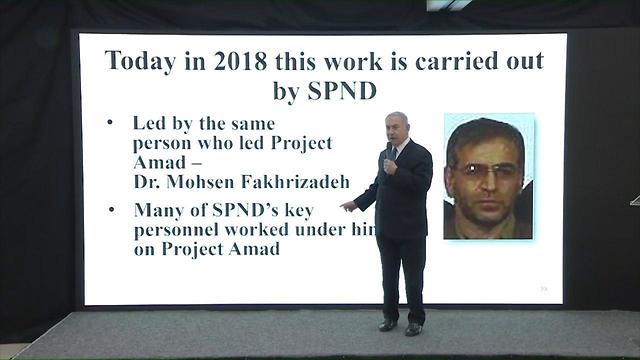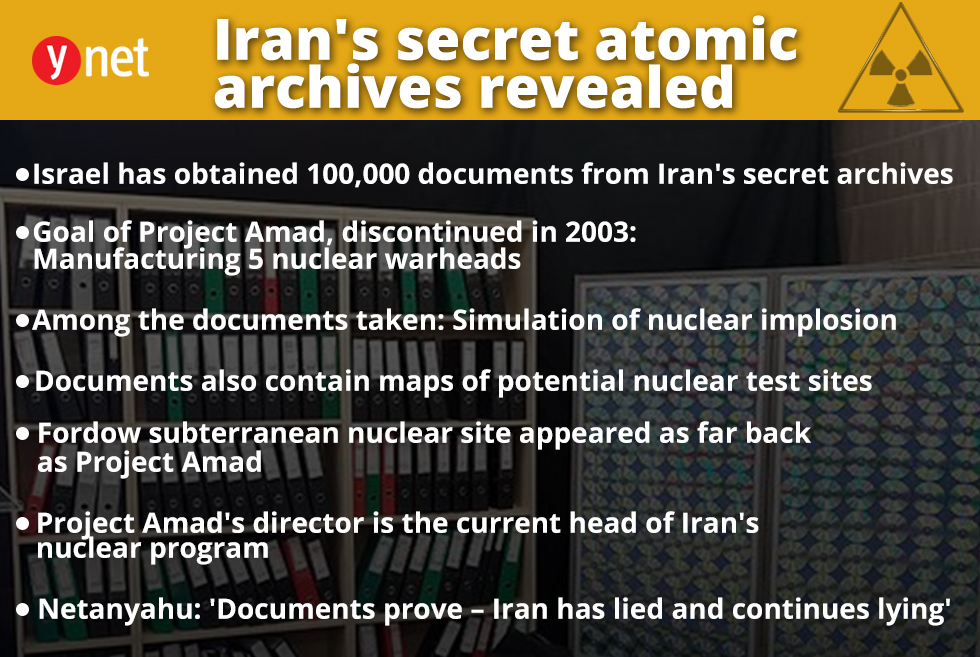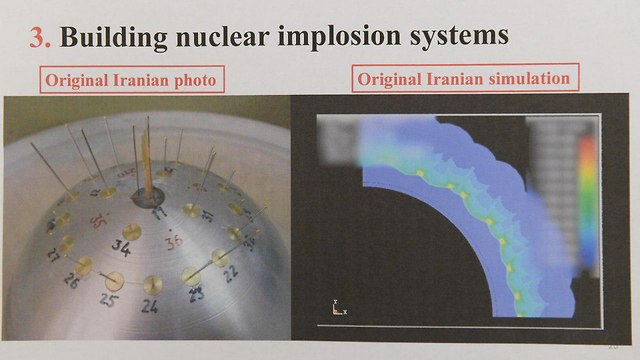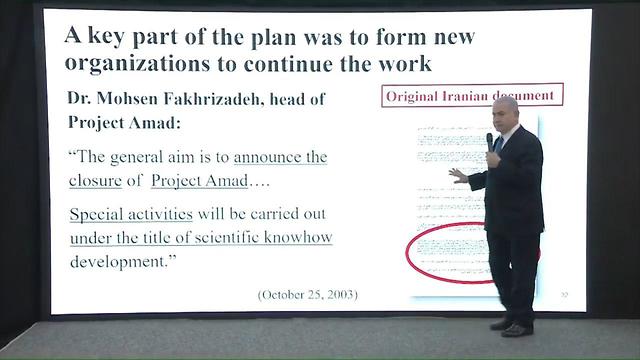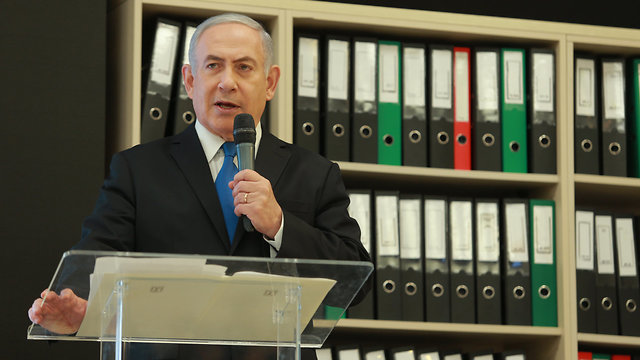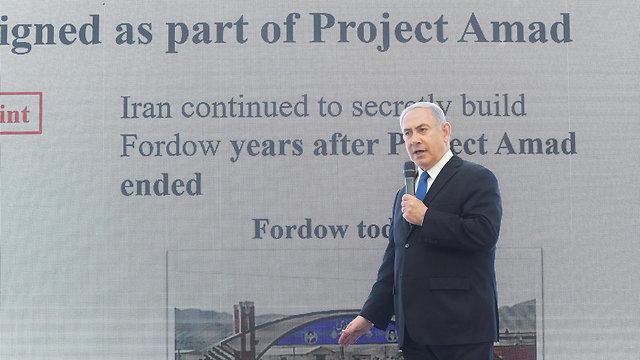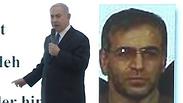

Profiling the 'father of the Iranian bomb'
One aspect of Netanyahu's speech revealing Iran's secret nuclear files was shining a light on the elusive Mohsen Fakhrizadeh, a senior IRGC officer and nuclear scientist who headed the Islamic republic's nuclear weapons project; 'Remember that name,' the prime minister said of a man who hardly anyone in the West has seen.
"Remember that name," the premier said when he first mentioned Fakhrizadeh, fingering him as the person leading the "weapons group" on the secret Iranian project, discontinued in 2003.
The presentation that accompanied Netanyahu's speech also presented for the very first time an alleged photo of Fakhrizadeh, as no reliable picture of the nuclear scientist could be found on the Internet up until now.
SPND is the Persian acronym for the Organization of Defensive Innovation and Research, an engineering unit behind the country's nuclear program. The group, first exposed in 2011, is comprised of seven departments, each overseeing a different aspect of the Iranian nuclear weapons research program.
The United States placed SPND on a blacklist in 2014, but the International Atomic Energy Agency (IAEA) was not given access to the Iranian agency's sites.
"You will not be surprised to hear that SPND is led by the same person that led Project Amad, Dr. Fakhrizadeh," Netanyahu added. "Not coincidentally, many of SPND's key personnel worked under Fakhrizadeh on Project Amad."
Despite his paramount importance to the Iranian project, Fakhrizadeh has thus far been cloaked in mystery. In 2014, the New York Times dubbed him an Iranian counterpart—with the requisite changes, naturally—of American physicist Robert Oppenheimer, the father of the American nuclear program and head of the Manhattan Project that led to the development of the first nuclear bombs in the 1940s.
For more than a decade, Fakhrizadeh was pinpointed as the driving force behind the Iranian plans to develop nuclear warheads for the multitudes of ballistic missiles the Islamic republic already possesses.
Present at a North Korean nuclear test
"If Iran one day attains nuclear weapons, Fakhrizadeh will be known as the bomb's father," a Western diplomat told the Reuters news agency in the past. A senior Iranian official echoed his sentiments, dubbing the shadowy figure an "asset" and an expert.
Fakhrizadeh dedicated all of his time to the country's technological development, he added, and was afforded the full support of Iranian Supreme Leader Ayatollah Ali Khamenei.
The 57 year old is considered to have headed Iran's nuclear program, known as Project 111 or Project Amad. An IAEA report from 2010 noted that Fakhrizadeh, then a senior officer for the Islamic Revolutionary Guard Corps, was still in positions relating to Iranian efforts to attain nuclear weapons.
In fact, the nuclear scientist was the only one explicitly singled out by name in the annex to the international nuclear watchdog's serious report on Iran's nuclear program.
His name was again floated in a 2007 United Nations resolution regarding his alleged involvement in nuclear research and ballistic missiles. Another IAEA report published the following year once again mentioned him briefly.
In 2013, Western intelligence sources revealed that Fakhrizadeh had attended a North Korean nuclear weapons test held that same year.
Iranian media, on the other hand, has almost never made mention of the scientist. In 2006, the Iranian news agency Mehr described him as a scientist working for the Defense Ministry and former head of a physics research institute. Several Iranian websites, meanwhile, characterized him as a university physics professor.
Sanctions on Fakhrizadeh to be removed
Very few people in the West have actually seen Fakhrizadeh. "He's a mystery man," said in 2010 an official who refused to be named from a country accusing Tehran of developing nuclear weapons.
One American activist noted that one sign pointing to Fakhrizadeh's importance was the fact that IAEA "has looked for him for a long time to interview him, but the Iranians refused."
Another activist named Mark Fitzpatrick, who serves as a director of an American anti-nuclear proliferation group, said that if the atomic watchdog had a wanted list, Fakhrizadeh would probably sit stop it.
American nuclear expert David Albright, meanwhile, previously noted that Fakhrizadeh was "gravely concerned" with the order to bring Project Amad to a stop in 2003.
Another sign pointing to the elusive nature of the nuclear scientist is that he never attended the innumerable meetings between his country and the West concerning the 2015 nuclear deal.
"He tried to evade assassins," one of the members of the Iranian delegation to talks explained to the Times, hinting at the elimination of members of Fakhrizadeh's scientific team, which the West attributed to Israel. "Wouldn't you run away?"
Despite the nuclear scientist's indelible mark on the program, the nuclear deal included a proviso stating that sanctions against him will be removed in the future. He will be removed from the West's blacklist in 2023, according to reports.
Netanyahu's speech, given a short time before US President Donald Trump is expected to make a decision on whether to stay in the nuclear deal or withdraw from it, may lead to a change in that regard.














